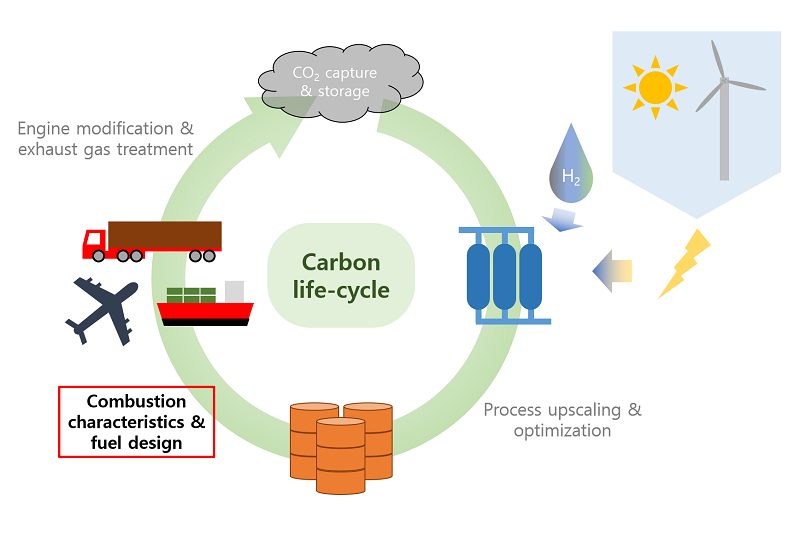
연구실 소개
차세대 연료 설계 및 평가 연구실은 수송부문을 포함한 주요 산업분야의 온실가스 감축과 탄소 의존도 저감을 위해 다양한 신재생, 저탄소 또는 탄소중립 연료에 관한 기초 연소 특성과 탄소 생애주기 분석에 관한 연구를 수행하고 있습니다. 특히 1000 K 이하의 온도 영역에서 주로 일어나는 저온 연소 현상에 대한 실험적 연구와 화학 반응 시스템 모델링, 그 외 관련분야 응용에 관해 관심을 가지고 있습니다.
연구실 담당교수
인적 사항
- 직위, 성명 : 교수 송화섭
- 연구실 : 테크노관 321호
- 전화 : 054-478-7292
- 이메일 : hwasup.song@kumoh.ac.kr
학위 및 경력
- 2003.3-2010.2 서울대학교 기계항공공학부 공학사
- 2011.3-2013.2 서울대학교 기계항공공학부 공학석사 (지도교수: 송한호)
- 2013.3-2017.2 서울대학교 기계항공공학부 공학박사 (지도교수: 송한호)
- 2017.3-2020.3 Postdoctoral researcher, Laboratoire PC2A, Université de Lille, France
- 2020.6-2021.2 서울대학교 정밀기계설계공동연구소 연구원
- 2021.3- 금오공과대학교 기계공학과 조교수
전공분야
- 연소공학, 내연기관, 차세대 저탄소 연료
담당 교과목
- 기계공학입문, 전공SW기초, 컴퓨터원용제도, 연소공학특론
주요 연구실적
논문
- C. Sampaio-Mergulhão, H-H. Carstenson, H. Song, S. Wagnon, W.J. Pitz and G. Vanhove, Probing the antiknock effect of anisole through an ignition, speciation, and modeling study of its blends with isooctane, Proceedings of the Combustion Institute 38 (2021) 739–748.
- H. Song, R. Dauphin and G. Vanhove, A kinetic investigation on the synergistic low-temperature reactivity, antagonistic RON blending of high-octane fuels: Diisobutylene and cyclopentane, Combustion and Flame 220 (2020) 23–33.
- H. Song and H.H. Song, Correlated ignition delay expression of two-stage ignition fuels for Livengood-Wu model-based knock prediction, Fuel 260 (2020) 116404.
- Y. Fenard, H. Song, H. Minwegen, P. Parab, C. Sampaio-Mergulhão, G. Vanhove and K.A. Heufer, 2,5-Dimethyltetrahydrofuran combustion: Ignition delay times at high and low temperatures, speciation measurements and detailed kinetic modeling, Combustion and Flame 203 (2019) 341–351.
- Y. Fenard, H. Song, R. Dauphin, and G. Vanhove, An engine-relevant kinetic investigation into the anti-knock effect of organometallics through the example of ferrocene, Proceedings of the Combustion Institute 37 (2019) 547–554.
- H. Song and H.H. Song, Knock Prediction of Two-Stage Ignition Fuels with Modified Livengood-Wu Integration Model by Cool Flame Elimination Method, SAE Technical Paper 2016-01-2294, 2016.
 기계공학전공
기계공학전공